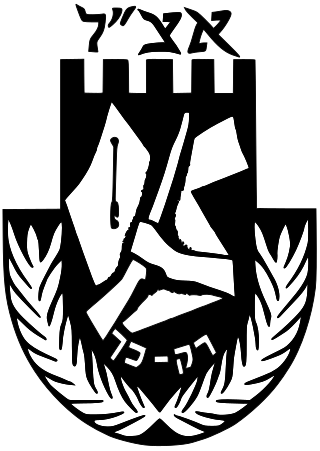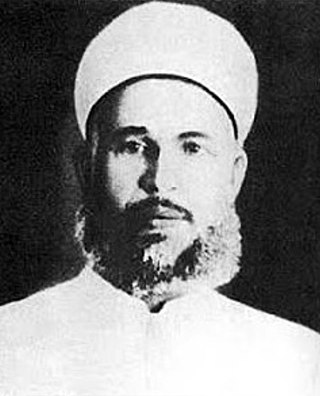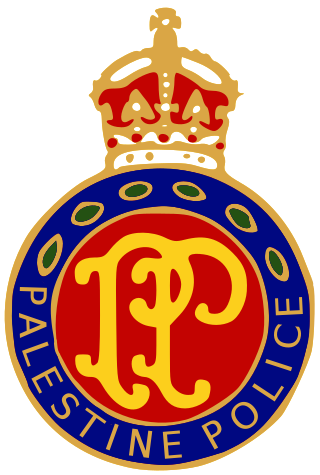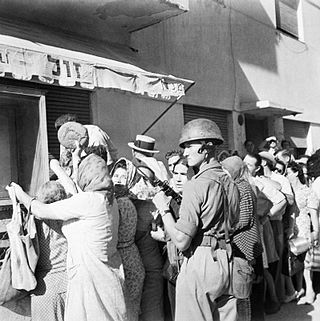
The Irgun, or Etzel, was a Zionist paramilitary organization that operated in Mandate Palestine and then Israel between 1931 and 1948. It was an offshoot of the older and larger Jewish paramilitary organization Haganah. The Irgun has been viewed as a terrorist organization or organization which carried out terrorist acts.
Haganah was the main Zionist paramilitary organization that operated for the Yishuv in the British Mandate for Palestine. It was founded in 1920 to defend the Yishuv's presence in the region, and was formally disbanded in 1948, when it became the core force integrated into the Israel Defense Forces shortly after the Israeli Declaration of Independence.

Mohammed Amin al-Husseini was a Palestinian Arab nationalist and Muslim leader in Mandatory Palestine.

The 1936–1939 Arab revolt in Palestine, later known as The Great Revolt or The Great Palestinian Revolt, was a popular nationalist uprising by Palestinian Arabs in Mandatory Palestine against the British administration of the Palestine Mandate, demanding Arab independence and the end of the policy of open-ended Jewish immigration and land purchases with the stated goal of establishing a "Jewish National Home". The uprising coincided with a peak in the influx of immigrant Jews, some 60,000 that year – the Jewish population having grown under British auspices from 57,000 to 320,000 in 1935 – and with the growing plight of the rural fellahin rendered landless, who as they moved to metropolitan centers to escape their abject poverty found themselves socially marginalized. Since 1920 Jews and Arabs had been involved in a cycle of attacks and counter-attacks, and the immediate spark for the uprising was the murder of two Jews by a Qassamite band, and the retaliatory killing by Jewish gunmen of two Arab laborers, incidents which triggered a flare-up of violence across Palestine. A month into the disturbances Amin al-Husseini, president of the Arab Higher Committee and Mufti of Jerusalem, declared 16 May 1936 as 'Palestine Day' and called for a General Strike. The revolt was branded by many in the Jewish Yishuv as "immoral and terroristic", often compared to fascism and Nazism. Ben Gurion, however, described Arab causes as fear of growing Jewish economic power, opposition to mass Jewish immigration and fear of the English identification with Zionism.

Safed is a city in the Northern District of Israel. Located at an elevation of up to 937 metres (3,074 ft), Safed is the highest city in the Galilee and in Israel.

Yishuv, Ha-Yishuv, or Ha-Yishuv Ha-Ivri denote the body of Jewish residents in Palestine prior to the establishment of the State of Israel in 1948. The term came into use in the 1880s, when there were about 25,000 Jews living in that region, and continued to be used until 1948, by which time there were some 630,000 Jews there. The term is still in use to denote the pre-1948 Jewish residents in Palestine, corresponding to the southern part of Ottoman Syria until 1918, OETA South in 1917–1920, and Mandatory Palestine in 1920–1948.

The 1920 Nebi Musa riots or 1920 Jerusalem riots took place in British-controlled part of Occupied Enemy Territory Administration between Sunday, 4 April, and Wednesday, 7 April 1920 in and around the Old City of Jerusalem. Five Jews and four Arabs were killed, and several hundred were injured. The riots coincided with and are named after the Nebi Musa festival, which was held every year on Easter Sunday, and followed rising tensions in Arab-Jewish relations. The events came shortly after the Battle of Tel Hai and the increasing pressure on Arab nationalists in Syria in the course of the Franco-Syrian War.

Izz ad-Din Abd al-Qadar ibn Mustafa ibn Yusuf ibn Muhammad al-Qassam was a Syrian Muslim preacher, and a leader in the local struggles against British and French Mandatory rule in the Levant, and a militant opponent of Zionism in the 1920s and 1930s.
The Black Hand was an anti-Zionist and anti-British Jihadist militant organization in Mandatory Palestine. It was founded in 1930 and led until the death of Syrian-born Sheikh Izz ad-Din al-Qassam in 1935, whose preaching was instrumental in laying the foundations for the formation of the Black Hand, which he used to proclaim jihad and attack Jewish settlers. The idea for such a group appeared to crystallize after the 1929 riots, though one source says a decision was taken after the Day of Atonement incident at the Wailing Wall in September 1928.

The Palestine Police Force was a British colonial police service established in Mandatory Palestine on 1 July 1920, when High Commissioner Sir Herbert Samuel's civil administration took over responsibility for security from General Allenby's Occupied Enemy Territory Administration (South).
The Palestinian people are an Arabic-speaking people with family origins in the region of Palestine. Since 1964, they have been referred to as Palestinians, but before that they were usually referred to as Palestinian Arabs. During the period of the British Mandate, the term Palestinian was also used to describe the Jewish community living in Palestine. The Arabic-language newspaper Falastin (Palestine) was founded in 1911 by Palestinian Christians.

The Sergeants affair was an incident that took place in Mandate Palestine in July 1947 during Jewish insurgency in Palestine, in which the Jewish underground group Irgun kidnapped two British Army Intelligence Corps NCOs, Sergeant Clifford Martin and Sergeant Mervyn Paice, and threatened to hang them if the death sentences passed on three Irgun militants—Avshalom Haviv, Meir Nakar, and Yaakov Weiss—were carried out. The three had been captured by the British during the Acre Prison break, tried, and convicted on charges of illegal possession of arms, and with 'intent to kill or cause other harm to a large number of people'. When the three men were executed by hanging, the Irgun killed the two sergeants and hung their booby-trapped bodies in a eucalyptus grove near Netanya.

A successful paramilitary campaign was carried out by Zionist underground groups against British rule in Mandatory Palestine from 1944 to 1948. The tensions between the Zionist underground and the British mandatory authorities rose from 1938 and intensified with the publication of the White Paper of 1939. The Paper outlined new government policies to place further restrictions on Jewish immigration and land purchases, and declared the intention of giving independence to Palestine, with an Arab majority, within ten years. Though World War II brought relative calm, tensions again escalated into an armed struggle towards the end of the war, when it became clear that the Axis powers were close to defeat.


The 6th Airborne Division in Palestine was initially posted to the region as the Imperial Strategic Reserve. It was envisioned as a mobile peace keeping force, positioned to be able to respond quickly to any area of the British Empire. In fact the division became involved in an internal security role between 1945 and 1948.
The Arab general strike in Mandatory Palestine of 1936 was a general strike of all Arabs in Mandatory Palestine engaged in labour, transport and shopkeeping, which began on 19 April 1936 and lasted until October 1936; and which degenerated into violence and the 1936–39 Arab revolt in Palestine.
Following are timelines of the history of Ottoman Syria, taken as the parts of Ottoman Syria provinces under Ottoman rule.

Mandatory Palestine was a geopolitical entity established between 1920 and 1948 in the region of Palestine under the terms of the League of Nations Mandate for Palestine.
This is a timeline of intercommunal conflict in Mandatory Palestine.

The 1929 Palestine riots, Buraq Uprising or the Events of 1929, was a series of demonstrations and riots in late August 1929 in which a longstanding dispute between Muslims and Jews over access to the Western Wall in Jerusalem escalated into violence.













